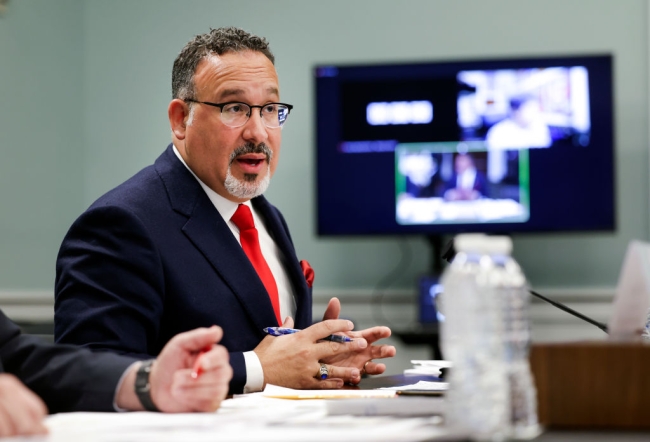You have /5 articles left.
Sign up for a free account or log in.

Education Secretary Miguel Cardona and his staff are planning to rewrite the rules for accreditors, cash management and other topics related to federal financial aid and institutional accountability this year. This round of rule making will probably be the last before President Biden’s first term expires.
Kevin Dietsch/Getty Images
The Education Department’s latest round of negotiated rule making is officially underway, though officials remain mum on what changes they are planning to propose as part of an ambitious regulatory agenda for the next year.
The Education Department heard from dozens of speakers during a two-day virtual public hearing on its regulatory agenda for the next year. The docket for this year includes amending regulations on accreditation, cash management, Return to Title IV, TRIO programs, state authorization, the definition of distance education and third-party servicers. (Title IV references Title IV of the Higher Education Act, which authorizes federal financial aid programs.)
“The goal here is building a higher education system that promotes upward mobility, equity and economic growth,” Education Under Secretary James Kvaal said at the beginning of the hearings. “We see the regulatory process as a tool to improve our programs and better serve students and taxpayers.”
Speakers from higher education associations, advocacy groups and other entities weighed in on just how exactly the department should approach those topics and who could be included on the committees that will negotiate the policies. Some speakers in particular urged the department to ensure that students serve as negotiators on the committees as well as faculty members.
The wide range of opinions and proposals presented over the two days highlights the challenge for the department in crafting the negotiating committees and drafting regulations. Several experts have previously said they were concerned about the department’s ability to put together committees with enough subject-matter expertise and time to dig into the different topics.
Accreditation
Many consumer advocates and researchers said the upcoming accreditation regulation changes are an opportunity to put in place stronger consumer protections.
The Biden administration is planning to rewrite the rules for accrediting agencies. The department’s regulatory agenda does not include details about what specific changes are planned, but several experts think officials will want to roll back the 2019 revisions enacted during the Trump administration that eliminated the regulatory distinctions between regional and national accreditors.
Jamienne Studley, president of the Western Association of Schools and Colleges Senior College and University Commission and chairwoman of the Council of Regional Accrediting Commissions, urged the department to consider the cost and benefits of any new regulations for accreditors.
“Many changes from the 2019 regulations have just been fully authorized,” Studley said. “It’s vital to carefully tailor changes.”
Other speakers said that current rules have allowed accrediting agencies to keep approving low-quality programs, and this upcoming round of rule making would be a chance for the department to strengthen the rules and ensure stronger protections for students. That could include a complaint process for accreditors that’s more accessible to students and faculty.
“Famously, accreditors provide second, third and fourth chances, even to the lowest-performing schools,” said Kelly McManus, vice president of higher education at Arnold Ventures, a philanthropy. “One even defended schools where 90 percent of students don’t graduate, saying that such a school can be ‘good … for those 10 percent who graduate.’ The department must raise the bar for accreditors that serve as gatekeepers to billions in federal aid.”
Michelle Dimino, deputy director of education at Third Way, a think tank, encouraged the department to place a stronger emphasis on student outcomes in the accreditation process.
Several students, including several connected to the military, shared their stories of being misled by colleges and left without a usable degree or certificate.
“I’m asking the department to consider rules to make sure that the accreditors and agencies that approve schools are not allowing schools to engage in unfair educational practices that hurt students,” said Jasmine Thomas, who attended a for-profit school in Nashville, Tenn., that she said withheld her degree.
Third-Party Servicer Guidance Controversy Continues
The department’s recent guidance expanding the definition of third-party servicers was a hot topic on the first day of hearings. Many speakers highlighted how the guidance would hinder study abroad programs and efforts to enroll more international students.
After the first day of hearings, the department clarified that it wouldn’t affect study abroad programs, recruitment of international students, partnerships with external medical facilities and course-sharing agreements. The department also is delaying the guidance’s effective date.
The breadth of comments highlights the difficult road ahead as the department plans to change the third-party servicer regulations in rule making. A number of organizations and companies opposed to the guidance have urged the department to use the rule-making process to make changes to the regulations for third-party servicers.
“With respect to third-party servicers, the department’s recently updated guidance about institutional requirements and responsibilities for third-party servicers has introduced significant confusion because the new guidance appears to change the regulatory definition of a third-party servicer,” said Jill Desjean, a senior policy analyst with the National Association of Student Financial Aid Administrators.
Desjean said NASFAA was grateful for the department announcement on guidance.
“It is critical that the department eliminate all potential negative unintended consequences if it moves forward with expanding the third-party servicer definition either during negotiated rule making or through guidance,” she said.
Moving forward, department officials will review the comments and then seek nominations for negotiators to serve on the committees, which will begin meeting this fall. Written comments on the agenda are due by April 24.




